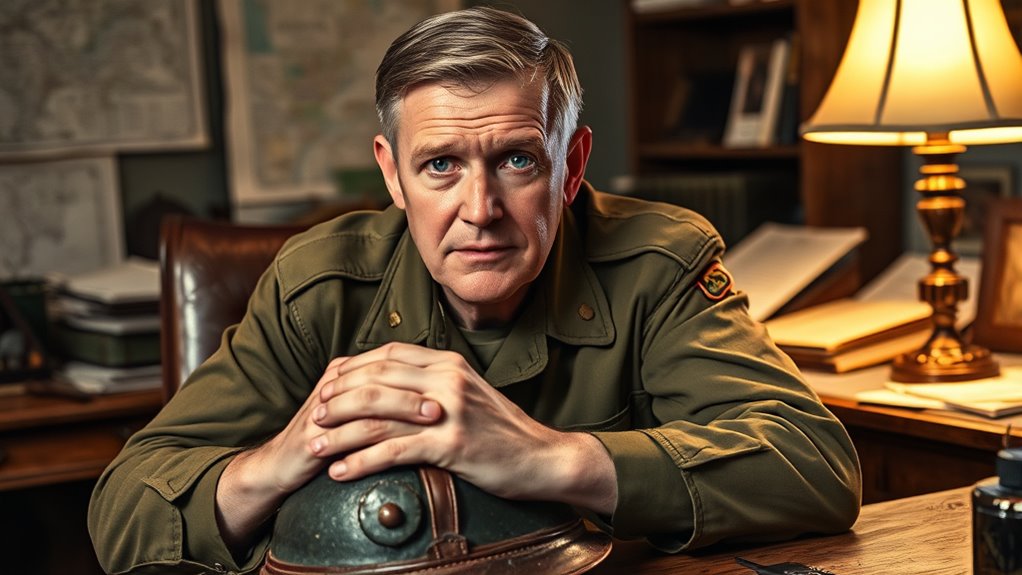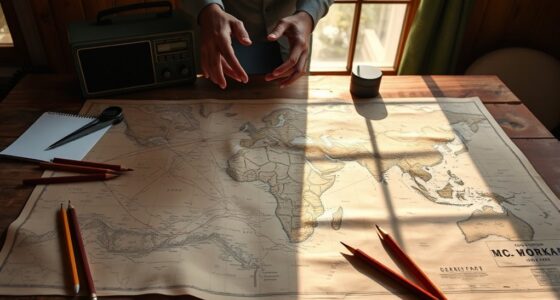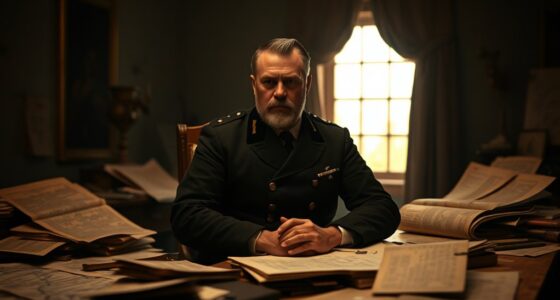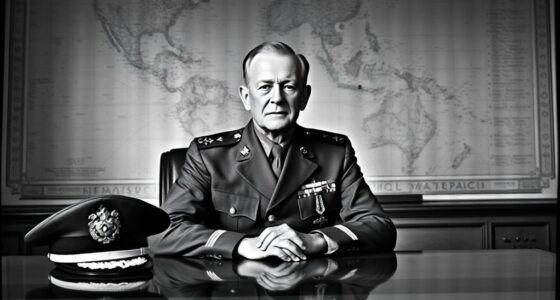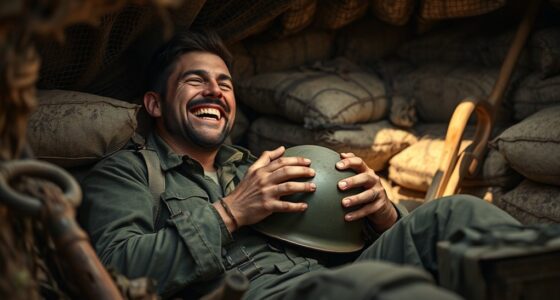George S. Patton teaches us that courage isn’t about not feeling fear, but about holding on just a little longer while feeling scared. When fear threatens to overwhelm you, your strength lies in persistence and decision to push through. Patton believed that by managing fear and staying disciplined, you can turn anxiety into motivation. If you keep exploring his mindset, you’ll discover how real leaders turn courage into victory.
Key Takeaways
- Courage involves managing fear and choosing to persist despite internal doubts or danger.
- Patton believed true leadership means holding on a little longer in the face of fear.
- Transforming fear into motivation is a core aspect of resilient military leadership.
- Success depends on pushing through chaos with confidence and decisive action.
- Courage is about resilience—remaining committed and inspiring others to do the same.
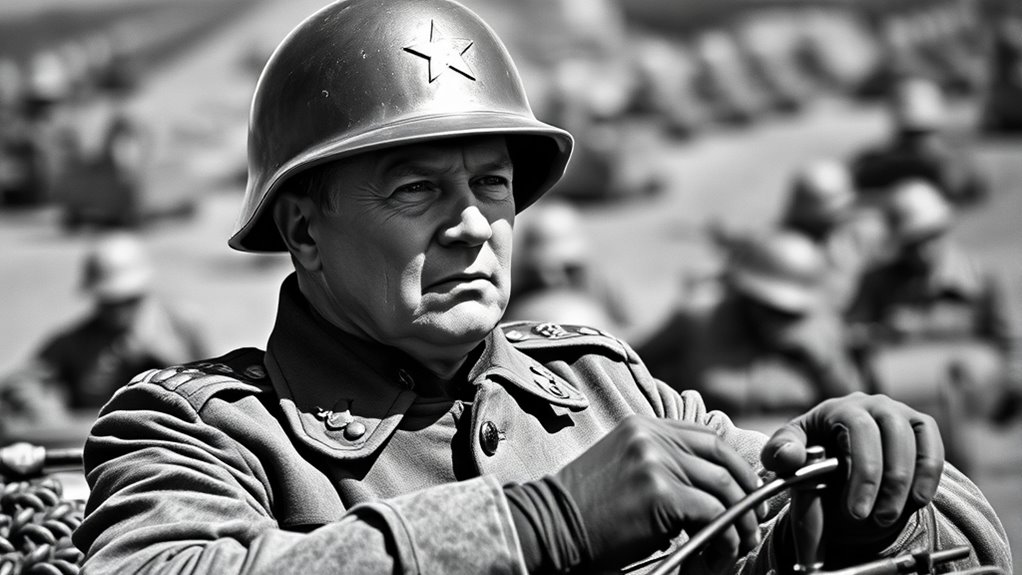
Courage isn’t the absence of fear; it’s the decision to hold on just a little longer, even when everything inside you screams to retreat. Think about that as you consider the legendary figure of George S. Patton. His leadership strategies didn’t just involve commanding troops; they embodied a fearless resolve that inspired those around him. Patton understood that true courage meant pushing through the fear and uncertainty, especially in the chaos of combat. His approach to leadership was rooted in relentless discipline, clear communication, and a refusal to accept defeat as inevitable. When he led his soldiers into battle, he did so with conviction, believing that morale and momentum could turn the tide of any engagement. This mindset was a core element of his military innovations—new tactics, aggressive strategies, and an emphasis on swift, decisive action. Patton’s innovation wasn’t just technological; it was psychological. He knew that inspiring confidence and instilling discipline could overcome even the most formidable obstacles.
As you reflect on his leadership style, consider how he used military innovations to give his forces an edge. Patton was quick to adopt new techniques and technologies, always seeking ways to outmaneuver the enemy. His strategies often involved rapid advances, surprise attacks, and relentless pursuit of victory. But underlying all of this was his unwavering belief that fear could be harnessed and transformed into a force for good. Instead of allowing fear to paralyze his troops, he encouraged them to confront it head-on, to hold just a little longer, and to trust in their training and his leadership. That’s the essence of courageous leadership—knowing that fear is natural, but refusing to let it dictate your actions. Recognizing the importance of psychological resilience was key to his success.
You can learn from Patton’s example that leadership isn’t about being fearless; it’s about managing fear intelligently. Military innovations played a essential role in his success, but his ability to motivate and inspire was even more critical. He believed that every soldier could tap into a well of resilience, provided they had a leader who believed in them and pushed them beyond their limits. When facing challenges, remember that the key isn’t to eliminate fear but to keep going despite it. That’s what sets true leaders apart, and it’s exactly what Patton exemplified. His courage showed that holding on just a little longer—against all odds—can lead to extraordinary victories.
Frequently Asked Questions
What Was George S. Patton’s Childhood Like?
In your early childhood, you experienced a disciplined environment shaped by your military family background. Your father’s military service influenced your values and interests, instilling a sense of duty and resilience. You grew up surrounded by stories of bravery and leadership, which motivated you to pursue a military career. Your upbringing emphasized discipline, courage, and perseverance, laying the foundation for the fearless leader you would later become.
How Did Patton Influence Modern Military Strategies?
You see, Patton revolutionized modern military strategies by emphasizing aggressive tank warfare and rapid blitzkrieg tactics. His bold leadership in World War II showcased how armored divisions could outmaneuver enemies quickly, boosting morale and effectiveness. By advocating for swift, relentless attacks, he influenced contemporary military doctrines, demonstrating the importance of mobility and decisive action in modern warfare. His innovations continue to shape military strategies today.
What Awards and Honors Did Patton Receive?
You should know that Patton received numerous military awards and honors recognitions for his leadership and bravery. These include the Distinguished Service Medal, Silver Star, Legion of Merit, and the Purple Heart. His exceptional service earned him high praise, and these military awards highlight his dedication and strategic prowess. Recognized both during and after his career, Patton’s honors solidify his status as one of history’s most celebrated military figures.
Did Patton Have Any Notable Personal Hobbies?
You’d find that Patton had interesting personal hobbies, including his painting hobbies and love for poetry. He often spent his free time painting, showcasing his artistic side, and he also enjoyed reading and writing poetry, which helped him express his thoughts and emotions. These hobbies provided a balanced outlet for him amidst the chaos of his military career, revealing a more personal and reflective side of Patton.
How Is Patton Remembered in Popular Culture Today?
You probably recognize Patton in popular culture through movies like the 1970 film “Patton,” where his charismatic and intense personality is vividly portrayed. His influence on leadership styles endures, inspiring military and civilian leaders to embrace boldness and decisiveness. Today, Patton’s legacy lives on, shaping perceptions of courage and strategic thinking, making him a legendary figure celebrated for his fearless approach and commanding presence in both history and entertainment.
Conclusion
Remember, courage isn’t the absence of fear—it’s pushing through it just a little longer. When you face challenges, think of Patton’s words and hold on for that extra minute. Sometimes, the hardest part is simply not giving up. Keep in mind, every storm runs out of rain, so hang in there. With courage like this, you’ll find that fear can become just another hurdle you’re brave enough to jump over.
